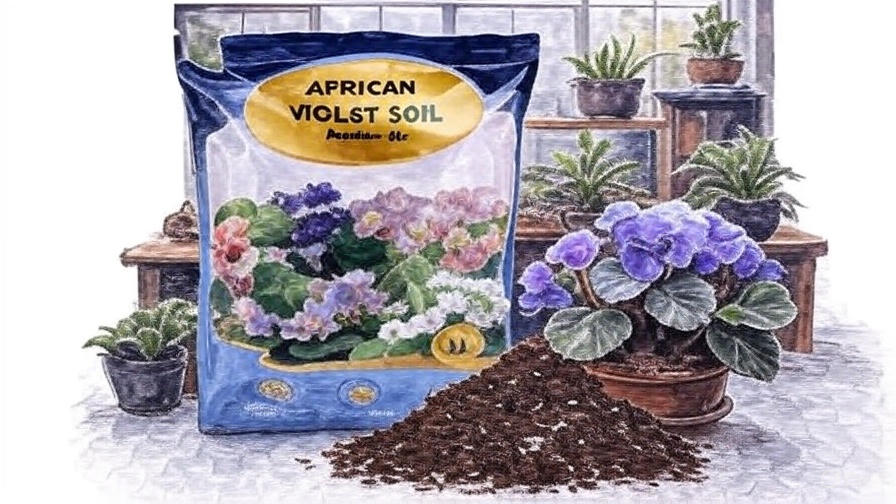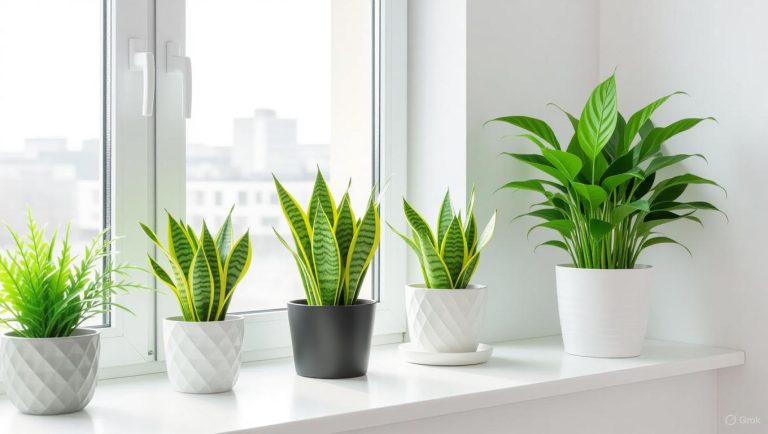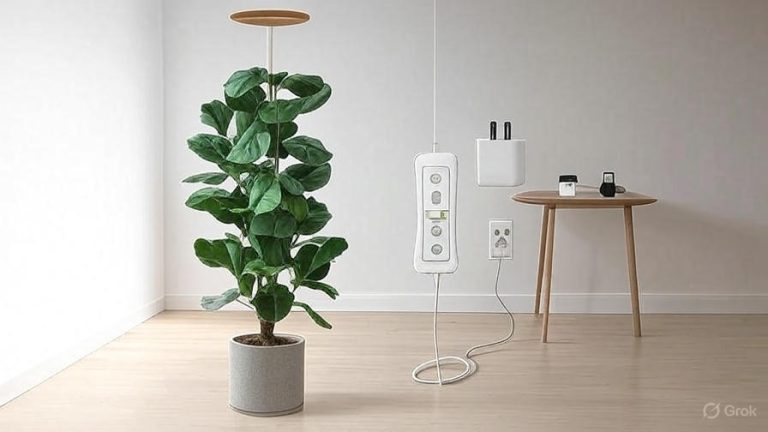5 Best African Violet Soil 2025
African violets rank among the most beloved houseplants, captivating gardeners with their velvety leaves and stunning blooms. Success with these charming plants begins below the surface with the right soil foundation. The perfect African violet soil creates an environment where roots breathe freely while maintaining optimal moisture levels.
This comprehensive review examines the top African violet soil mixes available today. We’ll explore what makes each product unique, analyze their key ingredients, and help you make an informed decision for your indoor garden.
Why African Violets Need Special Soil
African violets originate from the mountainous regions of East Africa, where they grow in well-draining, organic-rich soil. African violets prefer a light soil mix that allows for good drainage, making standard potting soil unsuitable for these delicate plants.
Regular potting soil poses several problems for African violets. Dense soil compacts around roots, preventing essential air circulation. Heavy mixtures retain too much moisture, leading to root rot and plant death. These plants cannot withstand waterlogged soil, so choosing a soil mix that drains well is essential.
The ideal African violet soil provides excellent drainage while maintaining consistent moisture. African violet soil should allow water to move through while having the proper amount of water retention without cutting off airflow. This balance supports healthy root development and encourages abundant flowering.
Soil pH plays a crucial role in nutrient absorption. African violets prefer slightly acidic conditions, between 5.8 to 6.5 pH. When pH levels exceed this range, plants struggle to absorb essential nutrients, resulting in poor growth and reduced blooming.
Key Components of Quality African Violet Soil
Understanding soil ingredients helps gardeners make better decisions when purchasing or creating African violet mixes. Each component serves a specific purpose in creating the perfect growing environment.
Peat Moss: The Foundation
Peat moss forms the backbone of most African violet soils. This organic material retains moisture while maintaining an airy structure. Peat moss naturally acidifies soil, bringing pH levels into the preferred range for African violets. Its fibrous texture creates air pockets that promote healthy root growth.
Perlite: For Drainage and Aeration
Perlite consists of expanded volcanic glass that creates excellent drainage properties. These white, lightweight granules prevent soil compaction and increase air circulation around roots. Start with a base of peat moss for moisture retention, then add vermiculite or perlite for that airy touch.
Vermiculite: Moisture Management
Vermiculite excels at moisture retention while still allowing proper drainage. This mica-based mineral expands when heated, creating a sponge-like material that holds water and nutrients. Vermiculite releases moisture gradually, providing consistent hydration for African violet roots.
Coconut Coir: Sustainable Alternative
Coconut coir serves as an eco-friendly alternative to peat moss. This byproduct of coconut processing offers similar moisture retention properties while being more sustainable. Coir has a neutral pH, which may require additional acidification for optimal African violet growth.
pH Adjusters: Dolomite Lime
Many African violet soils include dolomite lime to balance pH levels. Most general mixes require the addition of dolomite lime to achieve an overall pH balance between 6.0 and 7.0. This mineral provides calcium and magnesium while buffering soil acidity.
Top 5 Best African Violet Soils: Detailed Reviews
1. Espoma Organic Natural and Organic Premium Potting Soil Mix for African Violets
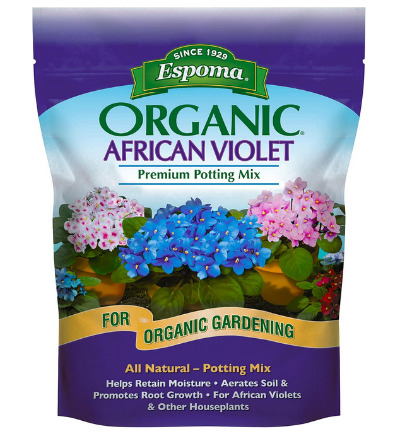
Rating: 4.8/5 Stars
Espoma leads the organic gardening industry with their specialized African violet formula. This 4-quart bag contains a carefully balanced blend of organic ingredients designed specifically for indoor flowering plants.
Key Features:
- 100% organic ingredients
- Pre-balanced pH levels
- Contains beneficial mycorrhizae
- Enhanced with earthworm castings
- Ready-to-use formula
The mix combines Canadian sphagnum peat moss, coconut coir, and perlite in optimal proportions. Espoma includes their proprietary Bio-tone microbes, which enhance nutrient uptake and promote root health. These beneficial organisms create a living soil ecosystem that supports long-term plant vitality.
Users consistently praise this soil’s drainage properties and plant performance. The organic composition eliminates concerns about chemical fertilizers while providing sustained nutrition. The 4-quart size suits most hobbyist needs without creating storage challenges.
Pros:
- Organic certification ensures chemical-free growing
- Mycorrhizal fungi improve nutrient absorption
- Excellent texture and drainage
- Long-lasting nutrition from organic components
Cons:
- Higher price point than synthetic alternatives
- May require supplemental fertilization during active growth
- Limited availability in some regions
2. African Violet Natural Potting Soil Mix (Made in USA)
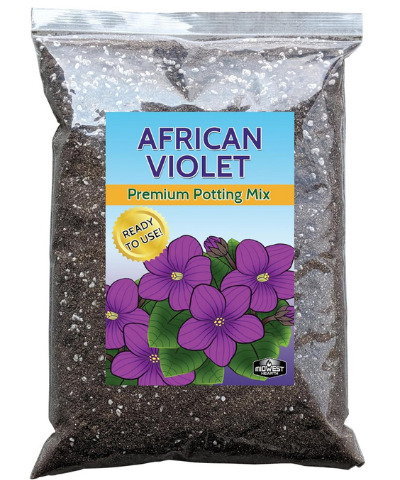
Rating: 4.6/5 Stars
This American-made soil mix provides a no-frills approach to African violet cultivation. The 4 dry quart package offers excellent value while maintaining quality standards expected by serious growers.
Key Features:
- Made entirely in the United States
- Simple, effective ingredient list
- Balanced drainage and retention
- Suitable for all African violet varieties
- Economical pricing
The formula emphasizes simplicity with peat moss, perlite, and vermiculite as primary ingredients. This classic combination has supported successful African violet growing for decades. The manufacturer focuses on consistency rather than exotic additives, resulting in reliable performance across different growing conditions.
Professional growers often choose this soil for its predictable behavior and cost-effectiveness. The absence of added fertilizers allows precise nutrient control through feeding programs. This flexibility appeals to experienced cultivators who prefer customized nutrition schedules.
Pros:
- Domestic production supports local economy
- Time-tested ingredient combination
- Consistent quality batch to batch
- Allows precise fertilizer control
Cons:
- Basic formulation lacks specialized enhancements
- No included mycorrhizae or beneficial microbes
- May require pH adjustment in some regions
- Plain packaging doesn’t stand out on store shelves
3. Professional African Violet Plant Soil Premium All Purpose Blend
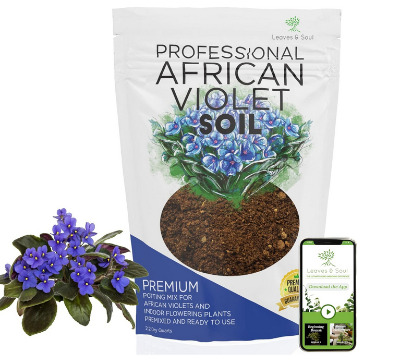
Rating: 4.7/5 Stars
The Professional blend targets serious hobbyists and commercial growers with its large 2.2-quart container and premium ingredient selection. This ready-to-use formula combines traditional materials with modern enhancements.
Key Features:
- Large container size for multiple plantings
- Professional-grade ingredient quality
- Contains peat moss, coco coir, perlite, and dolomite
- Balanced moisture retention and drainage
- Made in USA with quality assurance
This soil stands out for its dual moisture management system. Peat moss provides initial water retention, while coconut coir offers sustained moisture release. Perlite creates drainage channels, preventing waterlogged conditions that harm African violet roots. Dolomite lime buffers pH levels within the optimal range.
The professional designation reflects consistent quality control and ingredient sourcing. Each batch undergoes testing to ensure proper pH levels and moisture characteristics. This attention to detail justifies the premium pricing while delivering reliable results.
Pros:
- Large size offers better value for multiple plants
- Professional quality control standards
- Dual moisture management system
- pH pre-balanced for immediate use
Cons:
- Higher cost per quart than basic alternatives
- Large container may be excessive for casual growers
- Professional focus may intimidate beginner gardeners
- Limited retailer availability
4. African Violet Potting Soil Mix 1qt Pre-Mixed Acid Soil by Omitgoter
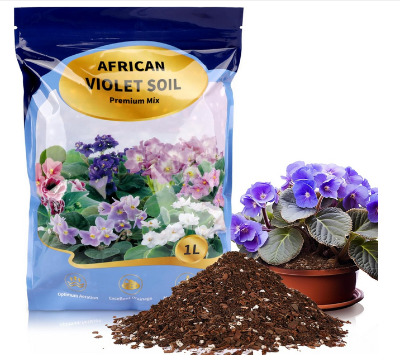
Rating: 4.4/5 Stars
Omitgoter’s compact 1-quart package provides an ideal starting point for new African violet enthusiasts. The pre-mixed acidic formulation eliminates guesswork while ensuring optimal growing conditions.
Key Features:
- Convenient 1-quart size for beginners
- Pre-acidified for immediate use
- Balanced nutrient uptake properties
- Designed for vibrant bloom production
- Affordable entry-level option
The acidic pH adjustment represents this product’s primary selling point. Many gardeners struggle with pH management, often discovering problems only after poor plant performance. This pre-acidified soil eliminates pH concerns while providing the slightly acidic environment African violets prefer.
The smaller container size appeals to apartment dwellers and casual gardeners. One quart provides enough soil for several small plants or one medium-sized repotting project. The focused formulation prioritizes bloom production through enhanced phosphorus availability.
Pros:
- Pre-acidified soil eliminates pH guesswork
- Perfect size for beginners or small collections
- Focuses on bloom enhancement
- Competitive pricing for casual gardeners
Cons:
- Small size offers poor value for large collections
- Limited ingredient information provided
- May require more frequent repotting due to container size
- Less established brand recognition
5. Sun Gro Horticulture Black Gold African Violet Mix
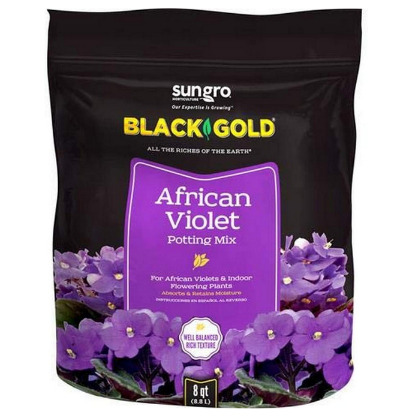
Rating: 4.9/5 Stars
Sun Gro Horticulture brings decades of professional growing experience to their Black Gold African Violet Mix. This industry-leading formula combines proven ingredients with modern processing techniques.
Key Features:
- Industry-leading brand reputation
- Professional greenhouse quality
- Enhanced drainage properties
- Screened and aged ingredients
- Consistent performance across batches
Black Gold represents the gold standard in professional growing media. Sun Gro processes ingredients through careful screening and aging to eliminate inconsistencies. The result is a uniform soil that performs predictably across different environmental conditions.
The enhanced drainage system prevents common problems associated with overwatering. Multiple perlite sizes create various drainage channels while maintaining soil structure. This engineering approach reflects Sun Gro’s commercial greenhouse expertise applied to home gardening.
Professional growers consistently choose Black Gold for its reliable performance and technical support. The company provides detailed growing guides and troubleshooting resources. This comprehensive support system helps gardeners achieve professional-level results at home.
Pros:
- Industry-leading reputation and quality
- Professional greenhouse formulation
- Excellent technical support resources
- Consistent batch-to-batch performance
Cons:
- Premium pricing reflects professional quality
- May be overly technical for casual gardeners
- Limited availability in some retail locations
- Professional focus may intimidate beginners
Soil pH and Nutrient Absorption in African Violets
pH levels dramatically affect nutrient availability in African violet soil. The soil should be slightly acidic, with a pH between 6.0 and 6.5. When pH levels fall outside this range, plants cannot efficiently absorb essential nutrients, regardless of fertilizer applications.
Acidic conditions improve the availability of iron, manganese, and phosphorus – nutrients crucial for healthy foliage and abundant blooms. Alkaline soils lock up these nutrients, creating deficiency symptoms even when nutrients are present. In conventional soil, your plant won’t be able to efficiently absorb nutrients.
Testing soil pH requires simple tools available at garden centers. Digital pH meters provide accurate readings, while test strips offer quick approximations. Regular testing helps gardeners maintain optimal growing conditions and adjust soil chemistry when necessary.
DIY African Violet Soil Recipe
Creating homemade African violet soil allows complete control over ingredients and costs. A good starting point is: 1 part peat moss, 1 part perlite, and 1 part vermiculite. This basic formula provides excellent drainage while maintaining proper moisture levels.
Advanced gardeners can customize recipes based on specific growing conditions. Humid environments benefit from additional perlite for improved drainage. Dry conditions require extra vermiculite or coconut coir for moisture retention. Recipes vary, but a 50:25:25 ratio of peat moss, vermiculite, and perlite is a tried-and-true mix.
Sterilization eliminates harmful pathogens from homemade mixes. Baking soil at 180°F for 30 minutes kills bacteria and fungi while preserving beneficial soil structure. Steam sterilization offers an alternative method using boiling water and sealed containers.
Common Soil Problems and Solutions
Dense, heavy soil creates the most common problems for African violet growers. Compacted soil prevents air circulation and traps excess moisture around roots. Symptoms include yellowing leaves, stunted growth, and eventual plant death from root rot.
Poor drainage manifests through constantly wet soil surface and musty odors from the container. Water pooling on the soil surface indicates inadequate perlite content or oversized containers. Improving drainage requires repotting with properly formulated soil mix.
Nutrient deficiencies often result from incorrect pH rather than insufficient fertilization. Yellowing leaves with green veins suggest iron deficiency caused by alkaline soil. Purple leaf undersides may indicate phosphorus deficiency from poor soil pH balance.
Repotting Schedule and Techniques
African violets require repotting every 6-12 months to maintain healthy growth. Violets grow best in a sterilized potting soil or commercial African violet soil mixture. Fresh soil provides renewed nutrition and improved drainage properties essential for continued blooming.
Signs indicating repotting needs include roots growing through drainage holes, water running straight through the container, or reduced flowering despite proper care. Soil that has broken down into fine particles no longer provides adequate drainage or aeration.
Proper repotting technique involves gentle root handling and appropriate container sizing. When potting, remember that violet leaves, stems and root systems are very tender and easily broken. Using containers only slightly larger than the previous pot prevents overwatering problems in oversized containers.
Watering Practices with Quality Soil
Proper watering techniques complement quality soil to create optimal growing conditions. African violets can be a little bit finicky about watering. They need well-drained, consistently moist soil to grow well. The key lies in maintaining consistent moisture without creating waterlogged conditions.
Bottom watering provides the most effective hydration method for African violets. Placing containers in water-filled trays allows soil to absorb moisture from below, preventing water contact with sensitive leaves. This technique also encourages deep root growth and prevents surface salt buildup from fertilizers.
Water temperature significantly affects plant health. Contact with cold water, especially in winter, can be damaging to the leaves. Room temperature water prevents shock and promotes better nutrient absorption through root systems.
Fertilization in Quality Soil
Even the best African violet soil requires supplemental fertilization during active growing periods. African Violets crave phosphorus for blooming. Use a fertilizer with a higher phosphorus content. Balanced fertilization promotes both healthy foliage and abundant flower production.
Organic soil mixes often provide sustained nutrition through slow-release components. Synthetic soils may require more frequent fertilization but offer greater control over nutrient timing. Understanding soil type helps gardeners develop appropriate feeding schedules.
Overfertilization causes salt buildup that damages roots and reduces flowering. Signs include white crusty deposits on soil surface, leaf tip burning, or sudden growth reduction. Overwatering is the fast track to root rot, while underwatering leads to drought stress. Balance is key.
Seasonal Soil Care Considerations
African violet soil requirements change with seasonal environmental conditions. Winter heating systems reduce humidity levels, requiring soil mixes with enhanced moisture retention. Summer air conditioning creates different challenges with increased air circulation and temperature fluctuations.
Spring repotting takes advantage of increasing day length and natural growth cycles. Fresh soil provides energy for the coming growing season while addressing any drainage issues that developed during winter months. This timing aligns with plants’ natural renewal periods.
Fall soil preparation involves reducing fertilization and monitoring moisture levels more carefully. Cooler temperatures and shorter days slow plant metabolism, reducing water and nutrient needs. Adjusting care routines prevents overwatering during dormant periods.
Storage and Shelf Life of Soil Mixes
Proper storage extends the useful life of African violet soil mixes while maintaining their beneficial properties. Sealed containers prevent moisture loss and contamination from insects or pathogens. Cool, dry storage areas preserve soil structure and ingredient integrity.
Organic soil components have limited shelf life compared to synthetic alternatives. Peat moss and coconut coir can develop mold if stored in humid conditions. Regular inspection of stored soil identifies problems before they affect plant health.
Opened soil bags require resealing to maintain quality. Transfer contents to airtight containers or seal original packaging carefully. Proper storage prevents pest infiltration and maintains consistent moisture levels for optimal plant performance.
Cost Analysis: Value vs. Performance
Premium African violet soils command higher prices but often provide superior plant performance and longevity. Professional-grade mixes may cost three times more than basic alternatives while delivering consistently better results. This investment pays dividends through improved plant health and reduced replacement costs.
Budget-conscious gardeners can create effective mixes by purchasing ingredients separately. Bulk peat moss, perlite, and vermiculite cost less than pre-mixed alternatives when used for multiple plants. However, convenience and consistent quality justify premium pricing for many gardeners.
Long-term cost calculations should include repotting frequency and plant replacement costs. High-quality soil that supports healthy growth for extended periods provides better value than cheap alternatives requiring frequent repotting or plant replacement.
Environmental Considerations
Sustainable gardening practices increasingly influence soil selection decisions. Peat moss harvesting impacts fragile bog ecosystems, leading environmentally conscious gardeners toward coconut coir alternatives. This shift requires understanding different moisture and pH characteristics of substitute materials.
Local sourcing reduces transportation costs and environmental impact while supporting regional economies. Many areas have local suppliers offering African violet soil mixes using regionally available ingredients. These products often cost less while providing materials adapted to local growing conditions.
Packaging considerations include recyclable containers and minimal plastic use. Some manufacturers offer bulk purchasing options that reduce individual packaging while providing cost savings for serious growers. These approaches align with sustainable gardening principles while meeting practical needs.
Conclusion: Making the Right Choice
Success with African violets begins with proper soil selection tailored to individual growing conditions and experience levels. The five products reviewed here represent the best options currently available, each offering unique advantages for different situations.
For organic gardening enthusiasts, Espoma’s certified organic formula provides chemical-free nutrition with beneficial microorganisms. The mycorrhizal enhancement supports long-term plant health while meeting organic certification standards.
Professional growers and serious hobbyists benefit from Sun Gro’s Black Gold formula with its consistent quality and technical support resources. The investment in professional-grade soil pays dividends through reliable plant performance and reduced troubleshooting needs.
Budget-conscious gardeners find excellent value in the African Violet Natural Potting Soil Mix with its simple, effective formulation and American manufacturing. This straightforward approach delivers reliable results without unnecessary complexity or premium pricing.
Beginners appreciate Omitgoter’s pre-acidified formula that eliminates pH concerns while providing an affordable entry point into African violet cultivation. The convenient size prevents waste while offering sufficient material for initial growing experiences.
The Professional blend offers the best balance of premium ingredients and large container value for gardeners managing multiple plants. The dual moisture management system provides insurance against both overwatering and drought stress.
Ultimately, the best African violet soil depends on individual growing conditions, experience level, and budget considerations. Any of these five options will support healthy plant growth when combined with proper watering, lighting, and fertilization practices. Start with quality soil, and watch your African violets reward you with vibrant foliage and abundant, colorful blooms that bring joy to any indoor garden space.

